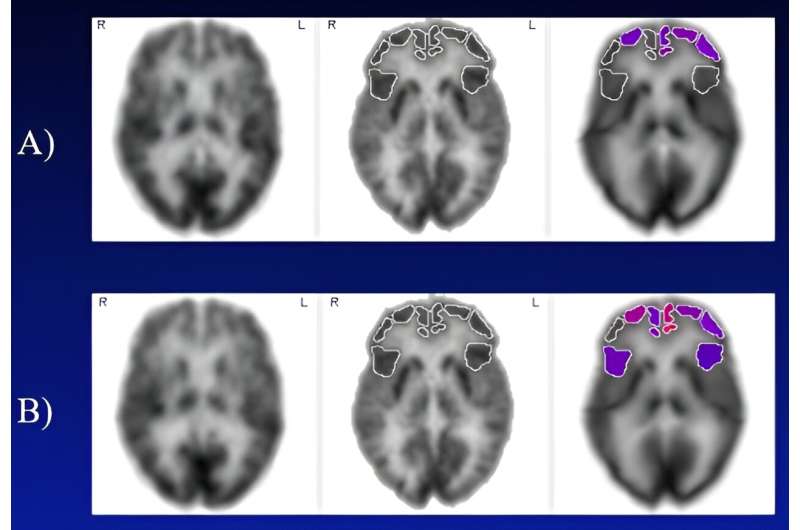This article has been reviewed according to Science X's editorial process and policies. Editors have highlighted the following attributes while ensuring the content's credibility:
fact-checked
peer-reviewed publication
proofread
Hearing aids help to slow the brain aging process in adults with mild cognitive impairment

The use of hearing aids can help to slow the metabolic decline that takes place in the brains of adults with mild cognitive impairment, according to research presented at the 2024 Society of Nuclear Medicine and Molecular Imaging Annual Meeting. Those who used hearing aids experienced less decline in brain metabolism than those with untreated hearing loss, especially in frontal regions of their cortex that are known to be important for executive functions or to decline with aging.
"While the impact of hearing loss and use of hearing aids upon the risk of developing dementia has been studied previously, the cross-comparison between subjects with hearing loss and subjects with hearing aids and changes in brain metabolism over time have not yet been elucidated," said Natalie Quilala, an undergraduate student at the University of California, Los Angeles.
"In this study, we report findings using longitudinal 18F-FDG PET scan data and neuropsychological assessments among subjects diagnosed with hearing loss, with and without the use of hearing aids."
From the Alzheimer's Disease Neuroimaging Initiative database, researchers identified subjects with amnestic mild cognitive impairment who were screened for hearing impairments and had annual FDG PET brain scans archived at, and for years after, baseline. These subjects were subsequently categorized into groups with untreated hearing loss, those with treated hearing loss by hearing aids, and a demographically matched control group with no diagnosed hearing impairment. Brain metabolism in 47 standardized volumes of interest from each of the FDG-PET scans was quantified and compared within- and between-groups in rate-of-change analyses.
The hearing loss group demonstrated significant annual metabolic decline in six frontal cortical regions and two superior temporal regions, while the control group exhibited significant decline only in two superior temporal regions, likely reflective of presence of an early neurodegenerative process in these subjects with mild impairment, but in none of the frontal cortical regions.
Strikingly, the hearing aid group did not experience significant annual metabolic decline in any frontal cortical region. Furthermore, direct statistical comparison of rates of decline in difference-of-differences analyses demonstrated that multiple frontal cortical regions declined significantly faster in the untreated hearing loss group than in the group treated with hearing aids, and that no frontal cortical region declined significantly faster in the hearing aid group than in the control group.
"These results suggest that while hearing loss can accelerate the decline in brain metabolism that occurs in people suffering from mild cognitive impairment, this acceleration may be largely mitigated through the use of hearing aids," stated Quilala.
More information: Abstract 242432: Quilala et al. Relationships between Hearing Loss, Hearing Aids and Trajectories of Regional Cerebral Metabolism in Subjects with Mild Cognitive Impairment, Journal of Nuclear Medicine (2024).




















